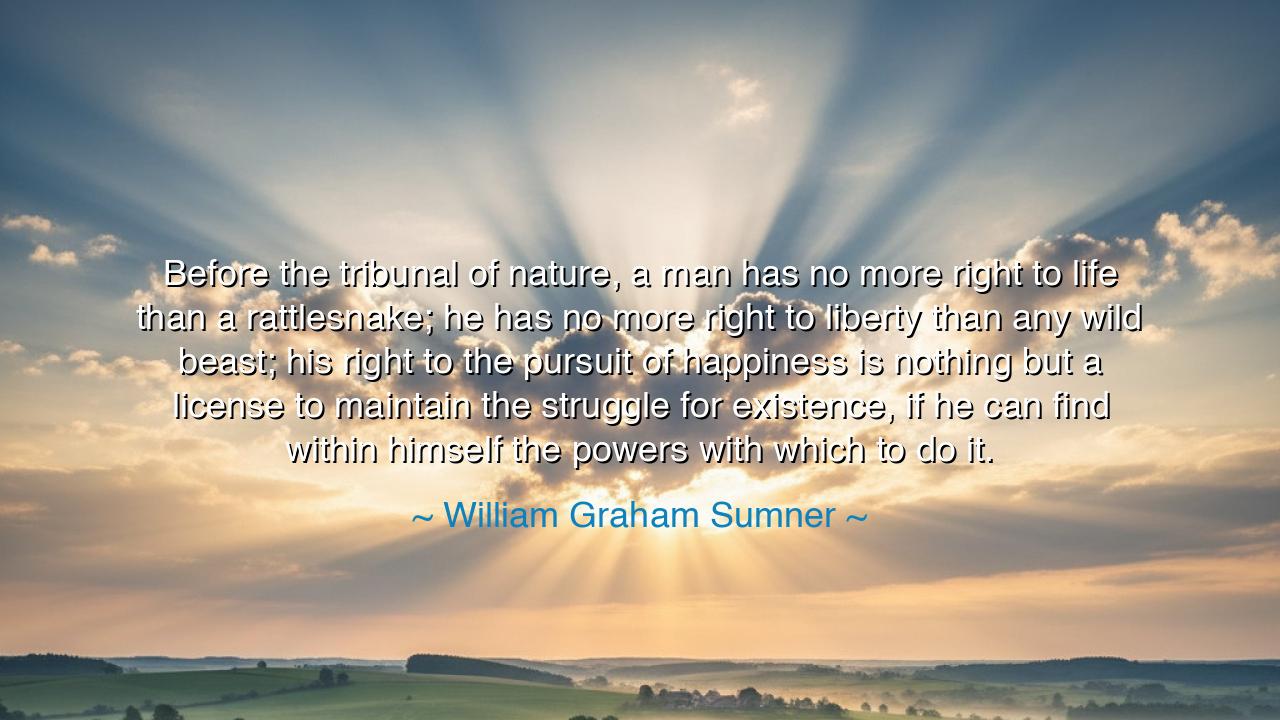
Before the tribunal of nature, a man has no more right to life
Before the tribunal of nature, a man has no more right to life than a rattlesnake; he has no more right to liberty than any wild beast; his right to the pursuit of happiness is nothing but a license to maintain the struggle for existence, if he can find within himself the powers with which to do it.






In a voice both fierce and unflinching, William Graham Sumner, the philosopher of realism and the stern teacher of human struggle, once declared: “Before the tribunal of nature, a man has no more right to life than a rattlesnake; he has no more right to liberty than any wild beast; his right to the pursuit of happiness is nothing but a license to maintain the struggle for existence, if he can find within himself the powers with which to do it.” These words, austere as stone, strike the heart like a judgment — yet within them lies the deep pulse of truth: that nature grants no favors, and that all survival, all freedom, and all joy are earned through strength, courage, and will.
Sumner, an American sociologist and thinker of the late nineteenth century, wrote in the era of industrial expansion and fierce competition. His philosophy, shaped by the doctrines of Social Darwinism, sought to remind mankind that beneath civilization’s comforts still beats the primal heart of nature. In that realm, mercy is not guaranteed, and rights are not bestowed by the universe — they are human inventions, fragile and conditional. To stand “before the tribunal of nature” is to stand naked before the eternal laws of existence, where the only test is one’s ability to endure. Nature, Sumner taught, recognizes no entitlement; it rewards not the wishful, but the capable.
Yet his words, though severe, are not without a strange reverence. For Sumner does not curse the harshness of life — he honors it. To him, the struggle for existence is not a punishment but a proving ground. Just as the rattlesnake defends its life through instinct and strength, so too must man rely on his own powers to secure his place in the world. Nature owes him nothing, but in her indifference lies a kind of justice: she gives every creature the same freedom — to fight, to adapt, to persevere. The weak may fall, but the strong, by their very endurance, shape the course of life. Thus, Sumner’s philosophy becomes a hymn to self-reliance, to the dignity of effort, to the sacred law of work and will.
This vision echoes the wisdom of the ancients. The Stoics spoke of a universe governed by immutable order — not by pity, but by reason. They too understood that man’s greatness lies not in what the world gives him, but in how he meets what the world withholds. Epictetus, born a slave, taught that while man cannot control the forces of nature, he can control himself — his courage, his virtue, his mind. In this, he triumphs. Likewise, Sumner’s words call us to accept the impartiality of life not as cruelty, but as the forge of strength. He demands that we abandon the illusion of entitlement and embrace the eternal discipline of self-mastery.
Consider the story of Theodore Roosevelt, who as a sickly child was told he might not live long. Yet he took Sumner’s lesson before it was spoken: he built his body through pain, sought wilderness and battle, and carved from hardship a spirit of steel. He met nature’s tribunal not with complaint, but with defiance — and in doing so, found his joy. Roosevelt understood what Sumner later declared: that the pursuit of happiness is not a promise of comfort, but a challenge to rise. Happiness, like life itself, belongs only to those who fight for it with strength, discipline, and purpose.
Still, there is a deeper moral beneath Sumner’s austerity. While nature may be indifferent, humanity need not be. By recognizing that our rights are not gifts but creations of our collective will, we understand that civilization is an act of triumph over chaos — a covenant between men who have chosen compassion where nature has none. Sumner’s words are not a rejection of progress, but a warning: if we forget the laws of endurance that underlie our freedom, we will lose both comfort and character. The strength to build must never be mistaken for the luxury to rest.
Let this then be the lesson passed to all who live in soft times: life owes you nothing — yet it offers everything to those with the courage to strive. Do not beg from fate what you can claim through effort. Do not envy the gifts of others, but cultivate your own power. Stand before nature’s tribunal with the pride of one who accepts its verdict and still dares to live. For though you may have “no more right to life than a rattlesnake,” you have something greater — the conscious will to rise above the instinct of the beast, to fight not merely for survival, but for greatness.
For as William Graham Sumner reminds us, the world is not a cradle but a crucible. And it is in the crucible — in the fire of struggle, in the cold indifference of nature — that the soul discovers its true worth. The one who learns this truth does not fear life’s hardness, but blesses it. For in the end, it is through the courage to fight, the strength to endure, and the will to act, that man earns not only his survival — but his immortality.






AAdministratorAdministrator
Welcome, honored guests. Please leave a comment, we will respond soon